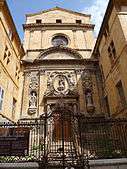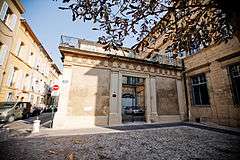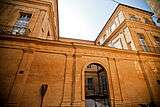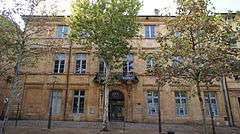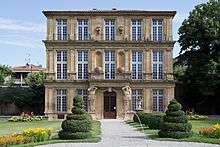Pierre Pavillon
| Pierre Pavillon | |
|---|---|
| Born |
20 February 1612 Paris, France |
| Died |
24 November 1670 (aged 58) Aix-en-Provence |
| Nationality | French |
| Occupation |
Architect Sculptor |
Pierre Pavillon (1612-1670) was a French architect and sculptor.
Biography
Early life
Pierre Pavillon was born on 20 February 1612 in Paris.[1][2] His father, Henri Pavillon (unknown-1651), was a painter.[2] His mother was Marguerite Guilheme.[2] His brother, Claude Pavillon, was a painter too, and his other brother, Henri Pavillon, was a sculptor.[2] He was trained as an architect in Paris from 1625 to 1630.[2]
Career
As an architect, his work focused on Roman Catholic religious buildings and on hôtel particuliers for the wealthy elite.[2]
He designed the Chapelle des Ursulines, a Roman Catholic chapel on the Rue Mignet listed as a monument historique since 1924.[1] Additionally, he designed the Chapelle Saint Mitre, another Roman Catholic chapel, on the Route d'Eguilles.[1]
He designed the Hôtel de Boisgelin located at 11, rue du Quatre-Septembre and listed since 1964.[1] He also designed the Hôtel de Lestang-Parade located at 18, rue de l'Opéra and listed since 1980.[1] Additionally, he designed the Hôtel de Forbin located at 20 Cours Mirabeau and listed since 1990.[1] He also designed the sculptures in the courtyard of the City Hall in Aix, listed since 1995.[1] Additionally, he designed the Pavillon Vendôme, listed since 1953.[1]
Personal life
He married Madeleine Clemens on 15 February 1638.[2] They had two sons:
He married Madeleine Grivet on 18 December 1653.[2] They had three children:
Legacy
The Rue Pavillon in Aix-en-Provence is named in his honour.[3]
Secondary source
- Jean Boyer, Pierre Pavillon (1612-1670): un architecte-sculpteur parisien en Provence (Nobele, 1968).[4]
Gallery
